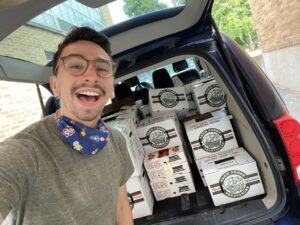Forestville Central School District
Breaking Through Barriers to Getting Local Food

The Forestville Central School District in Upstate New York has gone all in with their farm-to-school initiative. Depending on the season, students can eat several local foods each day. And eager to take advantage of the agricultural bounty within their community, the school purchased its first farm-raised hog for the 2020–2021 school year. Adding local farm-raised meat has allowed the district to maximize their school lunch reimbursement through the New York Farm to School Incentive.
“That personal connection has made us fearless,” Superintendent Renee Garrett says. “We’ve been able to break through many of the barriers to getting local meats.”
The school district participates in the New York State Farm to School Institute—a year-long educational program led by AFT’s Farm to Institution New York State, or FINYS, to aid schools across the state in their farm-to-school efforts.
Garrett says the key to the program’s success is the culinary background of Nick Weith, the district’s cafeteria manager and farm to school coordinator. Not only does the trained chef bring contagious energy for trying new recipes, but he also excels at budgeting and has cut costs at the same time the school has increased its local purchases.
“People think farm products are more expensive, but they’re not,” Weith says. “When I was looking for melons they were $9 from a regional distributor, compared to $5 at the farm. We even got yellow doll watermelons for $1.”
Ramping up local purchasing hasn’t been as hard as people would think, according to Garrett. And the extra work is rewarded with healthier, local products available in the cafeterias.
“A lot of what has made us successful is that we say yes,” she said. “Don’t be afraid to give it a try.”
Learn more about Farm to Institution New York State.

